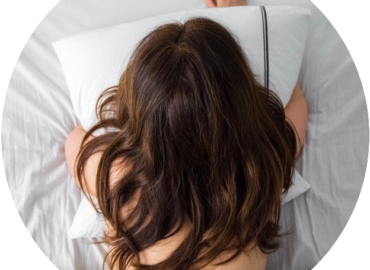Does Snoring Mean You Have Sleep Apnea?
Problem snoring can often be observed in overweight people and males in particular, with the condition typically getting worse in many cases with age. Snoring can be an indication of obstructed breathing, and it is never something you should take lightly. One of the most common questions that people usually ask is, “does snoring mean you have sleep apnea?” Well hopefully this post will clear up some of the confusion surrounding the issue!
What’s Behind All the Noise?
The noisy sounds often associated with snoring occur every time air flowing through the passages at the back of the nose and mouth are obstructed. This is a collapsible part of the airway wherein the upper throat and tongue meet the uvula and soft palate. Snoring takes place once these structures hit one another and vibrate while you breathe.
In kids, snoring is also an indication of problems with the adenoids and the tonsils. A child who chronically snores must undergo proper examination by an expert who can suggest the necessary treatment for the child to regain full health and establish consistent sleep once more.
Snorers may suffer from the following:
- Excessive throat tissue bulkiness – Children with large adenoids and tonsils usually snore. The neck of people who are overweight may have some excess soft tissue which can cause narrowing in the airway. Tumors or cysts are some of the rare causes behind the airway narrowing and another reason to see a specialist for advice.
- Poor muscle tone of the throat and tongue – Once muscles are excessively relaxed, the tongue can fall backwards to the airway or throat muscles may be drawn inwards from the sides restricting the air passageway. It is natural to relax when you are in a deep sleep but it can lead to an issue if over exacerbated by excess tiredness, alcohol or certain medicine that can cause the body to be in a state of excessive relaxation.
- Uvula or long soft palate – A long palate can narrow the opening from nose to the throat. Too much length of the uvula or soft palate serves as a noisy flutter valve in the process of breathing in a relaxing manner.
- Obstructed nasal airways – A blocked or stuffy nose needs additional effort for pulling sufficient air flow into it. It can sometimes create an exaggerated vacuum inside the throat which can then pull the throat’s floppy tissues together, which results in snoring. This means that snoring might only happen with a sinus infection or cold or during hay fever season. In addition, deformities of the nasal septum essentially the nose area, like deviated septum can lead to this kind of obstruction.
So with some of the reasons for snoring listed, lets move on to the topic of sleep apnea and what it is, how its evaluated and how it can be treated!
What Makes Snoring Serious?
Realistically speaking, snoring can disturb sleeping patterns and deprive the snorer of sufficient rest. The snoring can in certain circumstances indicate OSA or obstructive sleep apnea which can lead to some serious and long term health concerns. Snoring may also make the snorer a subject of ridicule or it can make the bed partner suffer from fatigue and sleepless nights.
Obstructive Sleep Apnea Defined
As already stated snoring can be a sign of a condition called OSA or obstructive sleep apnea. OSA is best characterized by several episodes of breathing pauses longer than 10 seconds at a time because of collapse or narrowing of the upper airway. It results in a reduced amount of oxygen in the bloodstream which in turn causes the heart to work much harder. Aside from that, it causes disruption to a person’s natural sleep cycle. It is this disruption that makes a person feel poorly rested in spite of spending adequate time in bed. Patients who suffer from sleep apnea may experience such events every night or on a frequent or infrequent basis depending on the severity and type of OSA present.
An immediate sleep apnea effect is that snorers should sleep lightly and keep throat muscles tense to keep the air flow to the lungs. Since snorers don’t get a good rest, they might feel sleepy during the day time. This feeling of sluggishness during the day can impair job performance and may pose problems, especially if a person is undertaking risky tasks that require their full attention at all times, such as hazardous equipment operators or drivers. An untreated obstructive sleep apnea boosts the risk of developing diabetes, strokes, heart attacks, and most medical issues.
Heavy Snorers – How Are They Evaluated?
Heavy snorers must seek medical advice to make sure that sleep apnea isn’t a problem. But what represents a heavy snorer? Well heavy snorers would generally include those people who snore on a constant basis in any sleeping position or who impact the sleep of a bed partner.
Otolaryngologists will give a thorough exam of the mouth, nose, throat, neck, and palate, frequently using a fiber optic scope. The exam will reveal if snoring is due to infection, adenoids, enlargement of tonsils, nasal obstruction, nasal allergy or other factor. A Sleep study at home or in a laboratory might also be necessary to determine if snoring is because of OSA, to gauge the severity of the snoring and essentially get a better understanding of that person’s condition.
Every snorer with any of these symptoms must be assessed for possible obstructive sleep apnea:
- History of stroke
- Heart disease
- High blood pressure
- Fatigue or daytime sleepiness
- Witnessed some episodes of apnea or breath pauses during sleep
Now Lets move onto some of the treatments available if you are diagnosed with OSA Obstructive Sleep Apnea.
What are the Available Treatments?
So treatments will basically depend on the level of the upper airway narrowing amongs others and using selected diagnosis by a specialist. In several instances, more than one area might be involved in causing an obstruction. OSA or snoring might respond to different treatments offered by most otolaryngologists, many of whom are neck and head surgeons, specializing in ENT conditions.
The following are some available treatments for the condition using surgical type procedures;
- The procedures of thermal ablation helps minimize tissue bulk in nasal turbinate’s, soft palate, and tongue base. Such procedures are used for both OSA and snoring. Various methods of the thermal ablation include radio frequency, laser, and bipolar cautery. Such procedures might be done in an operating room during an office visit and some treatments may require the procedure to be carried out in a surgical theatre.
- UPPP or also known as uvulopalatopharyngoplasty is a surgery for treating obstructive sleep apnea and snoring. It gets rid of excess soft palate tissue as well as opening up the airway. An added benefit is that the remaining tissues usually stiffen as they heal, thereby reducing the vibration effect of tissue. The air passage’s size might be enlarged further once a tonsillectomy is added to the process.
- More often than not, obstructive sleep apnea is treated using a device that can open airway with just a small amount of pressure. This positive pressure is actually delivered through a nasal mask that is worn by the person during sleep. This type of treatment is known as CPAP, which is the preferred initial treatment for most patients that have OSA.
So to answer the question does snoring mean you have sleep apnea? Well, the best way to determine that for certain is by consulting your doctor or specialist as soon as possible if you are experiencing, or have experienced at some point any signs you may have sleep apnea.
If you found this post useful please like and share it and as always feel free to comment on this or any other posts we have on the site. If you found a solution to your snoring, we’d love to hear it!




